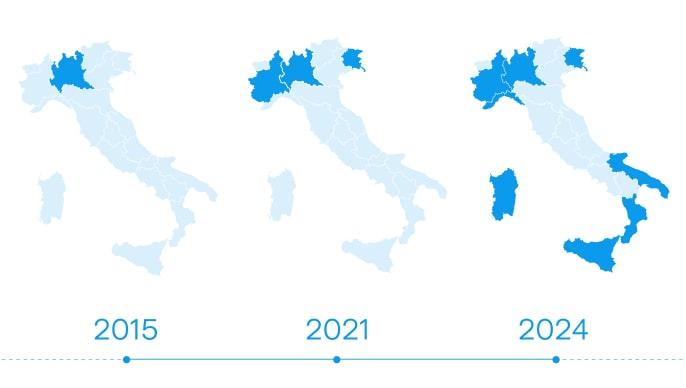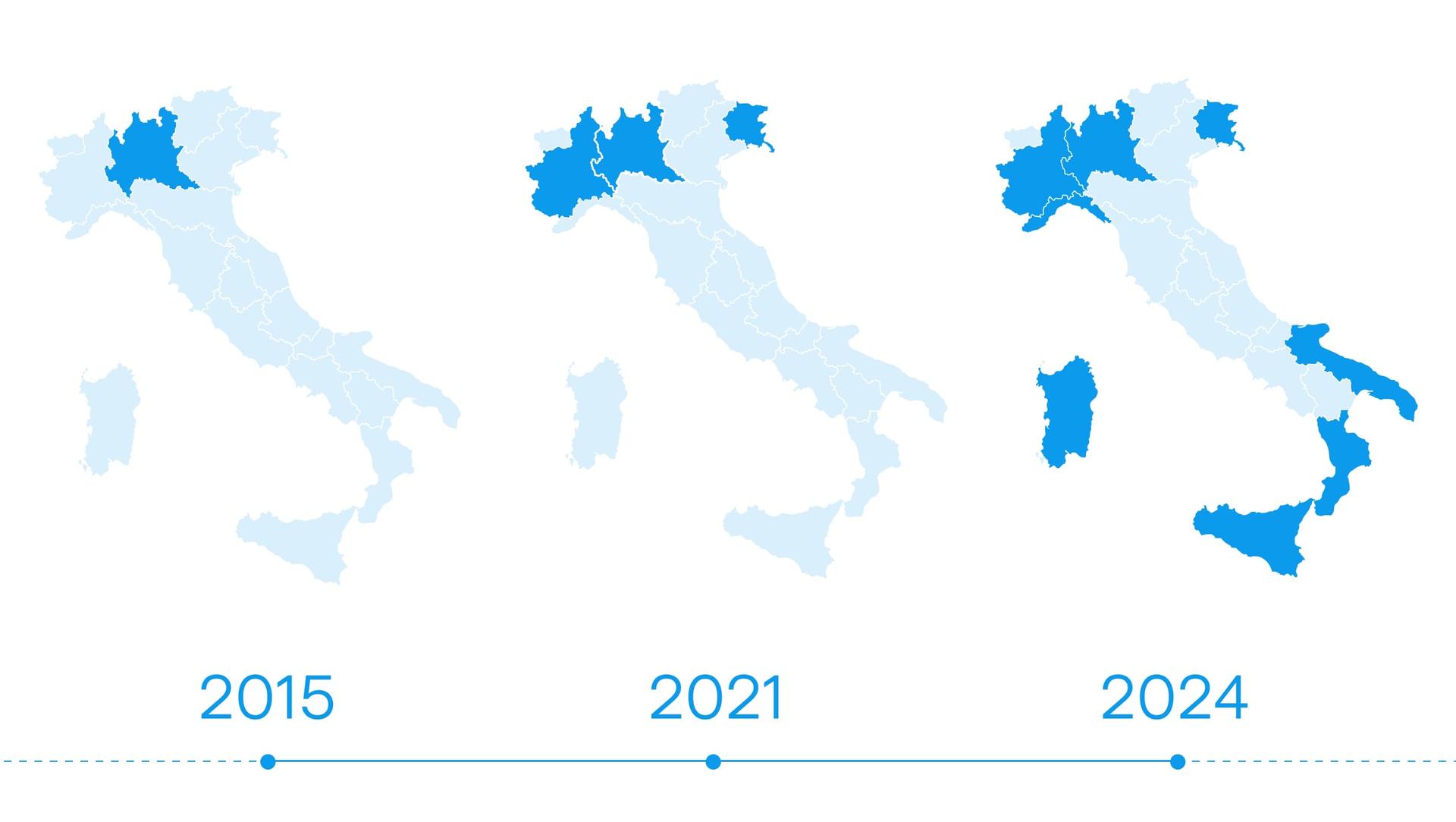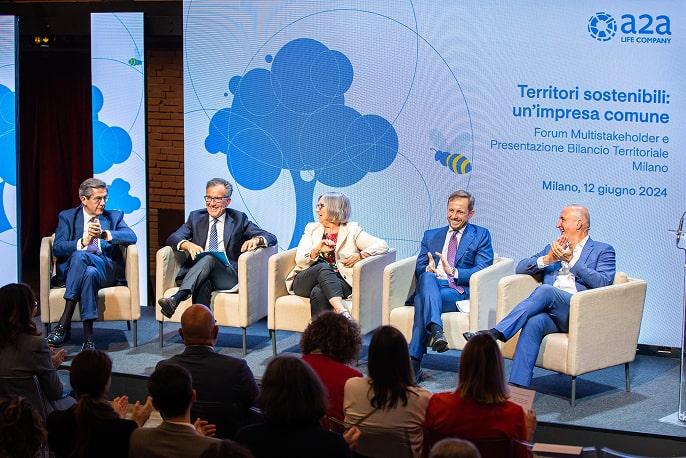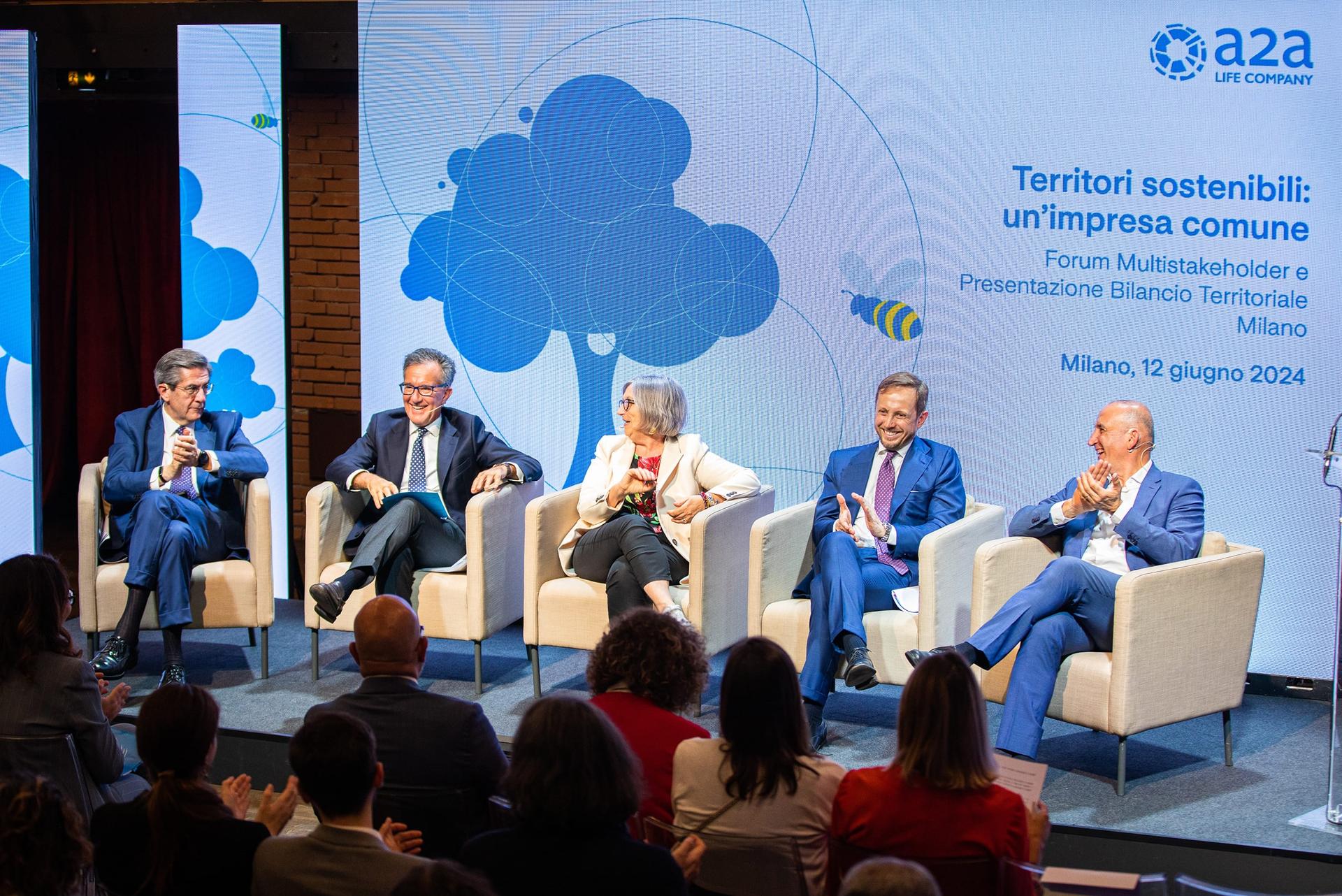- Listening to stakeholders
- The Multistakeholder Forums
- Life Talks
- Our digital platform
- Focal Point
- Initiatives
Listening to stakeholders
We want to guide our choices by paying attention to our partners
Stakeholder engagement was created with the aim of creating shared and lasting value for the wellbeing of communities and translates into the desire to align the Group's actions with the interests and demands of our stakeholders.
In January 2002, a Group Policy on Stakeholder Engagement was published, setting out the guidelines by which we engage our stakeholders.
Over the years, we have identified 7 macro-categories of stakeholders that we address throughout our value chain:
The Multistakeholder Forums
We have created a structured program of co-planning to build together the future of the territories
Since 2015, to respond to the specific needs of the communities where it operates, we have consolidated a structured listening dialog process with local stakeholders that includes work sessions and regular public meetings.
Over the years, we have developed several innovative formats, including ‘Right Turns’, a confrontational model that compares complex decisions where both options seem viable and require careful consideration, and ‘Alliances for a Fair Transition’, to build alliances with stakeholders and accelerate an ecological transformation with concrete solutions.
In 2024, the roadshow "Sustainable Territories: A Joint Venture", in partnership with TEHA, was guided by the concept of IMPACT, which runs along three complementary dimensions. On the one hand, our commitment to generating positive impacts, because without concrete results, actions remain intentions. Second, the need to build alliances, because in an increasingly complex world, no one can do it alone. And last, the importance of designing and implementing concrete actions through which everyone can make their own contribution to creating tangible and lasting change in their communities.


The 2024 path: focus and territorial expansion
The 2024 roadshow focused on two strategic themes:
- Sustainable supply chains: A sustainable transition is not only a matter of ethics, but also of competitiveness. Institutions and the financial community have raised the bar for companies, as has the introduction of the EU’s new CSRD and CSDD regulations. The objective is to identify collective actions to help companies in the territory, and particularly in our supply chain, accelerate their sustainable transition and improve their environmental, social and governance performance.
- Protecting local biodiversity: the balance of our ecosystems is closely linked to climate trends, and the economic and social development of communities is highly dependent on nature and its services. The EU’s Nature Restoration Law and the CSRD guide companies in this direction. The aim is to identify collective actions to increase territorial awareness of the protection of local biodiversity, fill information gaps and take concrete measures to protect the specificities of local ecosystems.
These priorities therefore reflect European regulatory developments and our role in supporting territories on their path to ecological transition.
As in the previous editions, activities in 2024 included:
- Closed-door work sessions on biodiversity and climate and sustainable supply chains: around 190 stakeholders from local communities attended. The meetings facilitated direct discussion of local needs and the development of joint solutions.
- Public events during which the Territorial Sustainability Reports were presented by top management. These documents are available on the company's website and summarize the Group's environmental, social and economic performance on an annual basis, using indicators that can be compared over time. The events also included talks between top management, local institutions and key opinion leaders and were attended by the press and leading stakeholders.
At the end, a summary report of the main findings in each area was produced. This document was shared with all those present and can be viewed at link.


The Multistakeholder Forums: a direct and ongoing communications channel
Before attending the forums, participants receive a detailed briefing on the topics to be discussed and the direct contact details of a Sustainability Stakeholder Engagement team member who is available to respond to any needs or suggestions before and after the meeting.
At the end of the closed-door working sessions, a senior or frontline member of the Group is always available to engage directly with the stakeholders who are present, facilitating a transparent discussion with the opportunity to highlight critical issues or specific examples of the local situation.
A2A Life Talks
We organized meetings to spread the culture of sustainability
In 2024, Sardinia, western Sicily and Liguria were included in the roadshow for the first time, following the recent expansion of the customer base and services, which required a specific positioning exercise. In these locations, the Multistakeholder Forums were held in collaboration with Lifegate, using the Life Talks format: meetings for the local people and the Group's stakeholders to spread a culture of sustainability and promote coherent, responsible communication in the communities where the company operates, with the presentation of territorial sustainability reports and in-depth discussions with researchers, scientists and key opinion leaders.
The central and common theme of the three events was the protection of biodiversity.
As part of this project, and in response to the need for information programs and awareness-raising campaigns on biodiversity, we decided to collaborate on the production of three special episodes of Lifegate's daily podcast 'News from Planet Earth', which covers the most important news on the environment, energy, biodiversity, human rights and sustainable mobility.
The three special episodes featured science communicators who took part in our Life Talks and the Group's Director of Strategy and Growth.
- Episode 1: «Biodiversity and sustainable lifestyles» - Valeria Barbi, naturalist and political scientist
- Episode 2: «Fake climate news and how to debunk it» - Ruggero Rollini, science speaker
- Episode 3: «What will the cities of the future be like?» - Lorenzo Giussani, A2A Strategy and Growth Director and Tessa Gelisio, presenter and environment speaker

territories
involved in the stakeholder engagement process
stakeholders
involved in closed door work sessions
participants
representing stakeholders from territories, institutions and local media
concrete initiatives
for territories launched in the past 3 years
territorial reports
presented and published on the site
Our digital platform
We monitor relationships with our stakeholders
In 2021 we implemented the joint use of an in-house digital platform that maps and monitors the progress of relations and initiatives undertaken with the various stakeholders to optimize stakeholder engagement and collect specific requests from areas where we operate with our services and activities.
Over the years, the mapping process has been made more comprehensive and complete by bringing the number of institutions involved to around 40 in 2024.
This mapping and evaluation allows us to achieve two objectives:
- measure relationships with communities affected by the Group's activities through numerical KPIs, using a corporate and BU perspective;
- monitor relations to adapt the Group's engagement activities and strategies to the different territorial contexts.
The process also requires the companies involved to indicate the number of initiatives per type for each stakeholder sub-category and to provide details of the most relevant initiatives.
The results of the entire process are shared and accessible through an interactive in-house report. By extracting comparable indicators across categories, territories and business units, the model enables stakeholder relations to be monitored over time and appropriate engagement plans to be defined.
Sustainability Focal Points
We have drawn up an in-house engagement plan to transfer sustainability practices within the company
The Sustainability Focal Points group, our network of employees entrusted with integrating sustainability values and objectives into all company processes, was formed in 2021.
Focal Points plays a key role in spreading the culture of sustainability and integrating ESG issues into all corporate processes, gathering the needs and expectations of the various stakeholders and acting as an intermediary between the Sustainability Development structure and the various Business Units and Corporate Functions.
We organize meetings and initiatives on a regular basis to network and create awareness in the Focal Points group.
Activities in 2024:
- Fresk workshop on the theme of biodiversity, an interactive format that gave participants the opportunity to reflect on the existing interconnections between ecosystems and how these can be impacted by human activities.
- Cycle of two virtual meetings, in collaboration with the World Energy Council Italian Committee, on the themes of COP29, with the aim of raising awareness, increasing critical spirit towards these topical issues and to seize opportunities for business.
Completed initiatives
We actively involve our stakeholders in co-designing and carrying out initiatives that generate shared value
Thanks to a structured process of listening to the territories, we establish an ongoing and in-depth dialog with communities and the contexts where we operate. Building lasting relationships with all key stakeholders allows us to adopt an approach that is geared towards generating a positive impact, based on the co-design and development of initiatives with shared value.
The regular monitoring of sustainability issues that are important for our stakeholders, which is carried out by company contacts through the stakeholder management platform, is a key element in ensuring that our actions are aligned not only with the Group's sustainability strategy, but also with the expectations of our stakeholders.
The projects of the three-year period 2022-2024
| Stakeholder | Topics | Initiatives | Description of initiative | Territory |
|---|---|---|---|---|
| Suppliers | Workers in the value chain | Sustainable Supply Chain | We have created a Vademecum, to support suppliers, especially SMEs, in overcoming the most critical aspects identified in ESG assessments and in integrating sustainability into the corporate strategy. |
National |
| Towns | Climate change Pollution |
Electric mobility for the territory | Together with local authorities and institutions, we have identified the most suitable areas for the development of electric mobility in the territory and we have started awareness-raising activities for users and citizens on sustainable mobility. | Sicily, Puglia |
| Industrial and tertiary sector customers SMEs | Climate change | Less energy consumption | We have proposed energy efficiency and autonomy solutions, with a focus on the “hard to abate” sectors and disseminated specific solutions, also in support of new regulatory obligations. | Bergamo, Brescia, Piemonte, Friuli-Venezia Giulia, Calabria, Puglia, Sicilia |
| Citizens | Affected communities | The power of “good” habits | We analyzed the perception, behaviors and level of awareness in the population on sustainable development through surveys and Focus Groups in order to collect information on the relationship between citizens and sustainability. | Bergamo, Brescia, Milano, Valtellina-Valchiavenna, Piemonte, Friuli-Venezia Giulia, Calabria, Puglia, Sicilia |
| Sustainable consumption | We have set up an Advisory Board dedicated to the discussion with local associations and entities on scenario analyses and results emerging from surveys conducted as part of the “The Power of Good Habits” initiative to find concrete solutions for reducing consumption by citizens and businesses for a sustainable transition tailored to the territory. The results have been formalized in the Sustainable Consumption Charter of Bergamo, Brescia and Milan. | Bergamo, Brescia, Milano | ||
| Together against energy poverty | We have mapped the needs of the territory with respect to the fight against energy poverty through dedicated discussion tables. |
Calabria, Puglia, Sicilia | ||
| Universities | Affected communities - Biodiversity and ecosystems | Workshop Pollenzo | We involved a group of students from the University of Gastronomic Sciences of Pollenzo in a research project on the protection and conservation of biodiversity. | Piemonte |
| School | Affected communities - Circular economy - Biodiversity and ecosystems - Climate change |
Call 2 action: citizens and schools for sustainability |
We involved schools in order to stimulate the younger generations to seek creative and innovative solutions to promote sustainable development. | National |
Useful resources
Services

A2A S.p.A. - P.I. 11957540153
